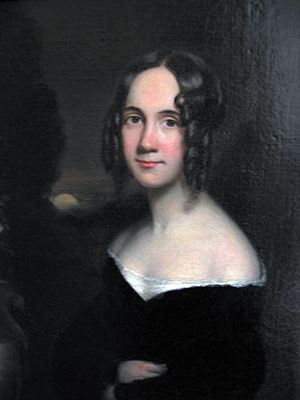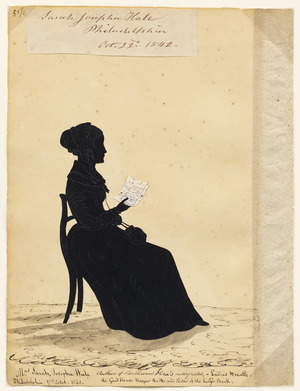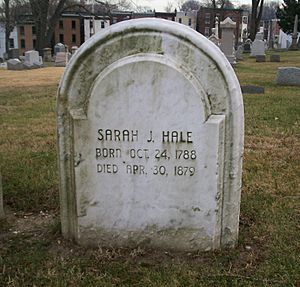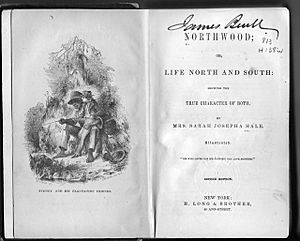Sarah Josepha Hale facts for kids
Quick facts for kids
Sarah Josepha Hale
|
|
|---|---|

Sarah Josepha Hale, 1831, by James Lambdin
|
|
| Born | Sarah Josepha Buell October 24, 1788 Newport, New Hampshire |
| Died | April 30, 1879 (aged 90) Philadelphia, Pennsylvania |
| Resting place | Laurel Hill Cemetery |
| Occupation |
|
| Spouse |
David Hale
(m. 1813; |
| Children | 5 (including Horatio Hale) |
Sarah Josepha Buell Hale (October 24, 1788 – April 30, 1879) was an important American writer, activist, and editor. She is best known for writing the famous nursery rhyme "Mary Had a Little Lamb". Sarah Hale also worked hard to make Thanksgiving a national holiday in the United States. She also helped finish the building of the Bunker Hill Monument.
Contents
Early Life and Family
Sarah Josepha Buell was born in Newport, New Hampshire. Her parents, Captain Gordon Buell and Martha Whittlesay Buell, believed that boys and girls should get the same education. Sarah was taught at home by her mother and her older brother, Horatio. Horatio had attended Dartmouth, and he shared his knowledge with Sarah. She mostly taught herself, which is called being an autodidact.
In 1811, Sarah met David Hale, a lawyer. They married on October 23, 1813. They had five children: David, Horatio, Frances, Sarah, and William. Sadly, David Hale died in 1822. After his death, Sarah Josepha Hale wore black clothes for the rest of her life to show her sadness.
Career and Writings
In 1823, Sarah Hale published her first book of poems called The Genius of Oblivion. She received financial help from her late husband's Freemason group.
Four years later, in 1827, her first novel was published. It was called Northwood: Life North and South. This book made Hale one of the first American women to write a novel about slavery. The book also suggested that the values of New England were a good example for the whole country. It became very popular right away. In the book, Hale wrote about how slavery was harmful. She believed it hurt both the enslaved people and the slave owners.
A minister named John Blake was impressed by Northwood. He asked Sarah Hale to move to Boston and become the editor of his magazine, the Ladies' Magazine. She agreed and worked as the editor from 1828 to 1836. She hoped the magazine would help educate women. She wrote that women should use their knowledge to improve the minds and morals of those around them.
In 1830, her collection Poems for Our Children was published. This book included the famous poem "Mary Had a Little Lamb". It was written especially for children.

In 1833, Hale started the Seaman's Aid Society. This group helped the families of Boston sailors who died at sea.
Editor of Godey's Lady's Book
Louis Antoine Godey from Philadelphia wanted Sarah Hale to edit his magazine, Godey's Lady's Book. He bought the Ladies' Magazine and combined it with his own. In 1837, Hale became the editor of the new, larger Godey's Lady's Book. She worked as editor for forty years, until she retired in 1877 when she was almost 90 years old.
During her time at Godey's, many important writers contributed to the magazine. These included women like Lydia Sigourney and Elizabeth F. Ellet, and men like Nathaniel Hawthorne and Washington Irving. Godey's Lady's Book became very influential. It helped shape American fashion, cooking, and even home design. The magazine had over 150,000 subscribers, which was a huge number for that time.
Sarah Hale wrote many novels and poems throughout her life, publishing almost fifty books.
Final Years and Legacy

Sarah Hale retired from editing in 1877. That same year, Thomas Edison used the first lines of "Mary's Lamb" as the first words ever recorded on his new phonograph. Sarah Hale died on April 30, 1879, in Philadelphia. She is buried in a simple grave in the Laurel Hill Cemetery.
Activist for Women
As an editor, Sarah Hale often wrote about women entering the workforce. She also published works by people like Catharine Beecher and Emma Willard, who supported education for women. Hale believed that physical activity and cheerfulness were important for children's learning.
Hale was a strong supporter of higher education for women. She helped to establish Vassar College, which was one of the first colleges for women. She wrote many articles about women's education, helping people accept the idea of an all-women's college. In 1860, she received an award for her work in female education.
Hale also worked to highlight the achievements of important women throughout history. Her book Woman's Record included over 2,500 entries about distinguished women. She believed that women's moral influence was very important to society.
Beliefs and Influence
Sarah Hale was seen as an expert on fashion, cooking, literature, and good behavior for middle-class women. She believed that women played a key role in shaping society's morals. She encouraged women to write novels that taught good values. However, she did not support women's suffrage (the right for women to vote). Instead, she believed women could influence men's votes quietly.
Hale was very devoted to the American nation. She was one of the first editors to focus on publishing American writers, rather than just reprinting articles from British magazines. She often published stories about American history, like the American Revolution. Hale was strongly against slavery and supported the Union during the Civil War. She used her magazine to promote a unified American culture.
Making Thanksgiving a National Holiday
Sarah Hale is largely responsible for making Thanksgiving a national holiday in the United States. Before her efforts, Thanksgiving was mostly celebrated in New England, and each state had its own date for the holiday. It was not well known in the American South.
She began campaigning for a national Thanksgiving holiday in 1846. For 17 years, she wrote letters to presidents like Zachary Taylor, Millard Fillmore, Franklin Pierce, James Buchanan, and Abraham Lincoln. Her early letters did not succeed, but her letter to President Lincoln convinced him. In 1863, Lincoln declared Thanksgiving a national holiday. This new holiday was seen as a way to unite the country after the Civil War. Because of her efforts, Sarah Hale earned the nickname "Mother of Thanksgiving." She also helped popularize the idea of turkey and stuffing as part of the Thanksgiving meal.
In her novel Northwood, Hale described many traditional Thanksgiving dishes. These included roasted turkey, gravy, stuffing, pumpkin pie, pickles, cakes, and drinks like ginger beer and cider.
Other Contributions
Sarah Hale also worked to preserve George Washington's Mount Vernon home. She saw it as a symbol of patriotism that could unite both the Northern and Southern states.
She also helped raise $30,000 to finish the Bunker Hill Monument in Boston. When construction stopped, Hale asked her readers to donate money. She also organized a week-long craft fair at Quincy Market. This fair sold handmade jewelry, quilts, food, and even autographed letters from famous figures like George Washington. Her efforts ensured that the 221-foot monument was completed.
A ship, Liberty Ship #1538, was named in her honor. A vocational high school in Brooklyn, New York, was also named after her, though it closed in 2001.
The Sarah Josepha Hale Award, a literary prize, is named for her. Famous winners include Robert Frost and Arthur Miller. She is also honored with a New Hampshire historical marker in Newport, New Hampshire, and is part of the Boston Women's Heritage Trail.
Selected Works
- The Genius of Oblivion; and Other Original Poems (1823)
- Northwood; a Tale of New England (1827)
- Traits of American Life (1835)
- Sketches of American character (1838)
- The Good Housekeeper (1839)
- Aunt Mary's new stories for young people (1849)
- Northwood, or Life North and South (1852)
- The Ladies' New Book of Cookery (1852)
- Liberia; or, Mr. Peyton's Experiments (1853)
- Flora's Interpreter; or, The American Book of Flowers and Sentiments (1853)
- The new household receipt-book (1854)
- Woman's Record: or Sketches of All Distinguished Women, from Creation to A.D. 1854 (1855)
- Mrs. Hale's New Cook Book (1857)
- Manners; or, Happy Homes and Good Society (1868)
Images for kids
See also
 In Spanish: Sarah Josepha Hale para niños
In Spanish: Sarah Josepha Hale para niños
 | William L. Dawson |
 | W. E. B. Du Bois |
 | Harry Belafonte |





